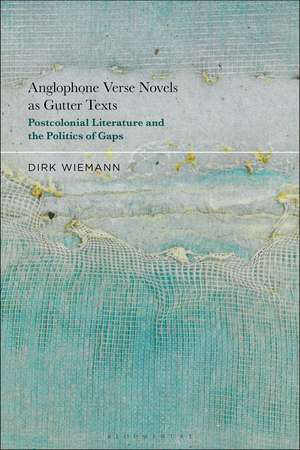Anglophone Verse Novels as Gutter Texts: Postcolonial Literature and the Politics of Gaps
Autor Prof. Dr. Dirk Wiemannen Limba Engleză Hardback – 12 iul 2023
Preț: 539.42 lei
Preț vechi: 773.45 lei
-30% Nou
Puncte Express: 809
Preț estimativ în valută:
103.23€ • 106.64$ • 85.91£
103.23€ • 106.64$ • 85.91£
Carte tipărită la comandă
Livrare economică 26 martie-09 aprilie
Preluare comenzi: 021 569.72.76
Specificații
ISBN-13: 9781501399503
ISBN-10: 1501399500
Pagini: 240
Ilustrații: 2 bw illus
Dimensiuni: 152 x 229 mm
Greutate: 0.49 kg
Editura: Bloomsbury Publishing
Colecția Bloomsbury Academic
Locul publicării:New York, United States
ISBN-10: 1501399500
Pagini: 240
Ilustrații: 2 bw illus
Dimensiuni: 152 x 229 mm
Greutate: 0.49 kg
Editura: Bloomsbury Publishing
Colecția Bloomsbury Academic
Locul publicării:New York, United States
Caracteristici
Poses an original analysis of contemporary verse novels as a world-literary genre, theorizing the role of 'gutters' in the verse text
Notă biografică
Dirk Wiemann is Chair in English Literature at University of Potsdam, Germany. He is author of Genres of Modernity: Contemporary Indian Novels in English (2008) and Postcolonial Literatures in English: An Introduction (2019, with Anke Bartels, Lars Eckstein and Nicole Waller), and editor of numerous collections, including Postcolonial Justice (2017, with Anke Bartels, Lars Eckstein and Nicole Waller).
Cuprins
List of figuresAcknowledgementsList of abbreviations1. Introduction: In the gutter ...1.1 Gutter texts and the politics of form1.2 Verse novels as gutter texts1.3 Gappiness and incompleteness1.4 Connexionism and minor cosmopolitanisms1.5 Gappy planet and incomplete nation: Michael Cawood Green's Sinking2. Volcanic verses: The planet as verb2.1 Sibylline cures: Derek Walcott's Omeros2.2 'Links between geology and character': Anne Carson's Autobiography of Red 2.3 The space that connects: Albert Wendt's The Adventures of Vela2.4 The planet as praxis: W.S. Merwin's The Folding Cliffs3. In/verse Britain: The poetics of the post-nation3.1 A million epiphanies now: Kae Tempest's Let Them Eat Chaos3.2 'But I dreamt of creating mosaics': Bernardine Evaristo's The Emperor's Babe3.3 Detoxing England: Patience Agbabi's Telling Tales3.4 Untelling tales: Anagrammatic Blackness in m. NourbeSe Philip's Zong!4. Epilogue: . looking at the stars BibliographyIndex
Recenzii
A lucid, conceptually rich and erudite intervention which brings into focus the 'aberrant', 'off-beat' genre of the Anglophone verse novel. Drawing attention to a flourishing bibliodiversity, Anglophone Verse Novels as Gutter Texts acts against the persistent centring of the novel as the pre-eminent form of literary world-making in postcolonial and world literature scholarship, thus offering a significant re-assessment of the field. Through a careful analysis of the social implications of 'gappy' form, Dirk Wieman fashions a compelling and layered argument about the verse novel's propensity to imagine alternative, unfinished social worlds and undecided futures.
Wiemann's wonderfully stimulating study ranges across the globe from the Global South to the post-Imperial metropolis, offering scintillating glimpses of little studied but vibrant and timely genre, the contemporary verse novel. Above all, Wiemann gives us new and vital insights into the relationship between literary form and the sociopolitical realities of our violent times.
Wiemann identifies an important and under-examined segment of the postcolonial canon - the verse-novel - and provides an eloquent defense and analysis of key works in that form, emphasizing the interconnectedness of formal and ideological analysis. A valuable expansion of the discourse of the "world novel" beyond the usual suspects.
Wiemann's wonderfully stimulating study ranges across the globe from the Global South to the post-Imperial metropolis, offering scintillating glimpses of little studied but vibrant and timely genre, the contemporary verse novel. Above all, Wiemann gives us new and vital insights into the relationship between literary form and the sociopolitical realities of our violent times.
Wiemann identifies an important and under-examined segment of the postcolonial canon - the verse-novel - and provides an eloquent defense and analysis of key works in that form, emphasizing the interconnectedness of formal and ideological analysis. A valuable expansion of the discourse of the "world novel" beyond the usual suspects.
